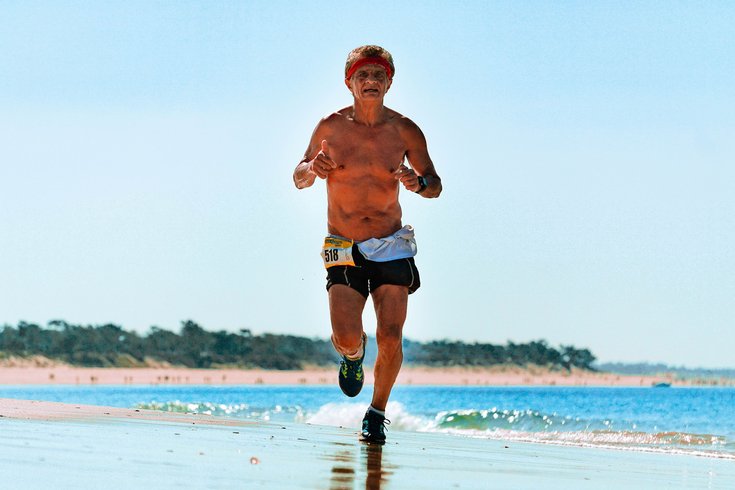
August 29, 2019
 RUN 4 FFWPU/pexels.com
RUN 4 FFWPU/pexels.com
As men get older, they should update their thinking about and definition of masculinity, for the sake of their health, Louis Bezich writes. For example, instead of running marathons older men can consider participating in 5K races with their adult children.
Maintaining healthy behavior is tough at any age but takes on new challenges as we get older. Incredibly, men, particularly those over 50, impose an added burden on themselves; an outdated sense of masculinity.
We all know the model, it's been drilled into our heads since we were kids: Guys don’t cry or show any emotion, men are tough and take risks, and men never show any weakness.
Unfortunately, as we age, we don’t update our thinking despite a growing recognition that this model needs to change for man of all ages, and a ton of evidence documenting the harm it can cause in older men.
This Neanderthal view translates into mindset that says we don’t need to see a physician on any regular basis or in any way manage our health. It makes us think we can still shovel the snow and carry out household chores because to do otherwise would make us less of a man. We can neglect our diet and level of activity because that’s what we were able to do when we were 20 without consequence. And we certainly don’t want to share our feelings or concede that our we need to approach life differently. My goodness, what a sissy-move that would be!
Now, I’m not suggesting that men can simply flip a switch to overcome this notion of masculinity which literally dates back to the cave man and some have called toxic masculinity. Edward Thompson a leading researcher on masculinity has said, “clear models of dignified masculinity are nonexistent for later life.”
Cultural change of the magnitude I’m advocating requires a conscious commitment, the support of women, partners and what I call a 50-plus man’s loving constituency, but it needs to happen. Far too many of the diseases that afflict older guys, like diabetes and heart disease, are self-imposed from unhealthy behavior. Moreover, the depression of feelings and minimization of social interactions leaves men vulnerable when we’re faced with the emotional challenges that aging brings. Creating a new definition of masculinity represents an opportunity for men to impact both current and future generations, stopping the proliferation this outdated mindset.
The healthy-behaving men over 50 I’ve studied suggest that such a shift in thinking is indeed possible. As a group, they demonstrated an open mind when it comes to their view of life. They’ve found fulfillment by adjusting their expectations, leveraging new strategies and losing the risky behavior.
During interviews, they shared practical, everyday stories of how they’ve adjusted their thinking:
· Hiring a neighborhood kid to clean gutters to avoid the risk of scaling a ladder
· Shifting from marathons to 5K races and running the races with adult children
· Adopting the practice of an annual physical.
So, how can men practice a new form of masculinity and rid themselves of the destructive practices of the past? Give some thought to the following:
· Delegate: You’ve proven that you can handle any number of tasks, whether around the house, at work, or elsewhere, now it's time to play executive and delegate. Focus on the high-order cerebral tasks of planning and strategy. Delegation will reduce the risks associated with physical tasks and allow you to leverage your experience and insights in other areas.
· Share: There’s no dishonor in sharing your feelings about anything, particularly your physical condition, aspirations and life’s priorities. Those that love and care about you want to know and want to help. It's worth repeating, men’s health is a team sport. Work with your team.
· Socialize: Social relationships, outside of business and golf, are not traditionally the purview of men. Men are nowhere near as socially-oriented as women. Develop a network of social contacts and use the interaction to bolster your well-being on any number of fronts. Your network will come in very handy if you find yourself coping with a tough situation like the loss of a loved one.
· Modify: Your value as a man is not defined by the amount of alcohol or food you consume. It' s OK to modify your intake and say “no thanks” after the third or fourth beer. The same goes with your dietary selections. Red meat is not proof of masculinity. Salmon is perfectly acceptable to the self-assured man.
· Manage: Many men know more about the health of the professional athletes they follow than their own. Think of preventative health in the context of the pampering that the pros get and it will make an annual trip to your primary care physician a very reasonable proposition. When something hurts or doesn’t look right man-up and get your butt to the doc. It won’t go away by ignoring it.
Aging is all about change; moving from the routine of employment to semi-retirement or retirement, or perhaps an encore career, keeping up with the needs of adult children and grandchildren, or perhaps just trying the make the most of this time in your life. Somehow, with all this change in play, we are chained to a culture of masculinity that restricts us for no reason other than it's all we know. Let’s not pass this to our sons. It's time we gave them a new model.
Louis Bezich, senior vice president of strategic alliances at Cooper University Health Care, is author of "Crack The Code: 10 Proven Secrets that Motivate Healthy Behavior and Inspire Fulfillment in Men Over 50."